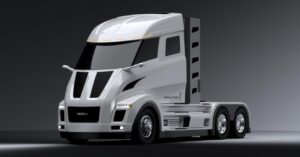Usually when you hear or read something about autonomous commercial vehicles, the word safety is mentioned. A lot.
The thought is that if you take humans out of the driving equation, you will eliminate human error.
Scratch beneath the surface, and you may find that like most things, a lot of it is being driven by greenbacks, dough, cash, or as Lyle Lovett croons, Mmmm O-N-E-Y.
Germany-based ZF Friedrichshafen AG, a global supplier of driveline and chassis technology, in a recent copy of its magazine has an article titled “Autonomous cost-cutting.” It says truck drivers used to be “the last of the adventurers” but now “have to reconcile the requirements of their forwarding companies and its customers, of legislators and of other road users. It’s all about transporting wares quickly, safely and as economically as possible.”
The freight boom is in part being driven by ecommerce and consumers’ expectations that they can order something online and get it in a few days or sooner. And, the economy is booming so there’s more freight.
More freight is a good thing. The booming economy is a good thing.
Businesses helping their bottom lines and streamlining their operations is a good thing.
I’m just not sure a rush to driverless anything is such a good idea.
The above-mentioned ZF has an “Innovation Truck” that’s being used at depots to carry out such tasks as loading and unloading; it uses “smart tags” that contain such digital information as whether the cargo has been damaged on its way to the depot or if the temperature controls weren’t working and the contents have been compromised.
Automation replacing human jobs isn’t a new thing and it can be a good thing depending on how the humans are treated.
A recent study says nearly 300,000 truck driving jobs could be replaced by autonomous trucks but I personally think that’s an over-statement. And I don’t think it’s going to happen any time soon.
United Nations figures show that 55 percent of the world’s 7.62 billion population currently live in urban areas, and a lot of autonomous and driverless technology seems to be aimed at city deliveries after hours when there’s less traffic.
That being said, however, it seems this global push to get driverless cars and trucks on the road is being rushed. But hey, maybe that’s just me.
I guess what I object to more than just driverless and autonomous technology is what seems to be a rush to take the human equation out of things — not just in trucking but in everything.
And I think that’s part of the digital, Facebook, YouTube world we live in. It’s a world where we can have “face time” with someone across the globe but a world in which many of us get insulated from other people by our technology.
I mean, I hate to go out to dinner with people and sit there while everyone is on their smartphones instead of talking to each other. Most of the people I go out to eat with are my age and feel the same way. People my step-daughter’s age and younger — not so much.
We have the world at our fingertips, but we need human interaction. My pastor is fond of saying that we get hurt by people but by the same token, God uses people to help heal us emotionally as well.
Driving a truck over-the-road can be a lonely job, and my heart aches for some of this newspaper’s letter writers who feel isolated, angry and alone.
Then I am cheered by other drivers who take the job with a grain of salt and are looking for someone they can help, whether it’s another truck driver, a four-wheel driver, or someone at a truck stop who needs a hot meal and a few dollars to help them get back on their feet.
When was the last time a machine bought your lunch? And don’t say when you ordered out on your cell phone.
Just sayin.’
Be safe out there and God bless.
Dorothy Cox is former assistant editor – now retired – of The Trucker, and a 20-plus-year trucking journalism veteran. She holds a bachelor’s degree in fine arts and a master’s degree in divinity. Cox has been in journalism since 1972. She has won awards for her writing in both mainstream and trucking journalism.







